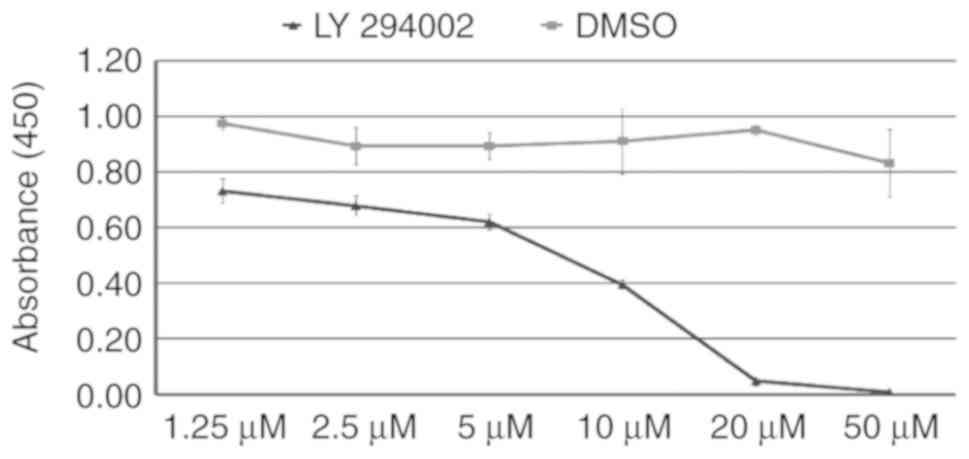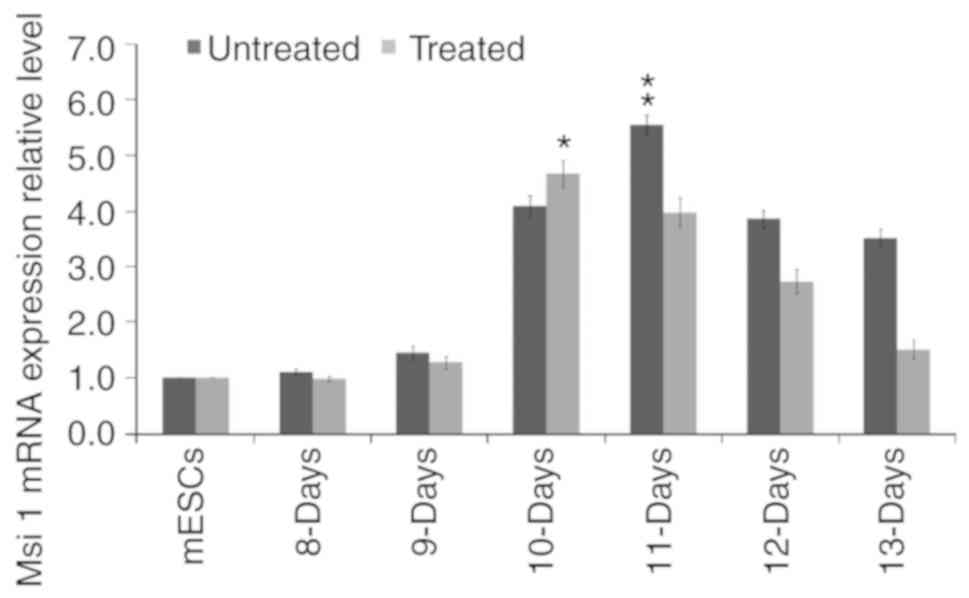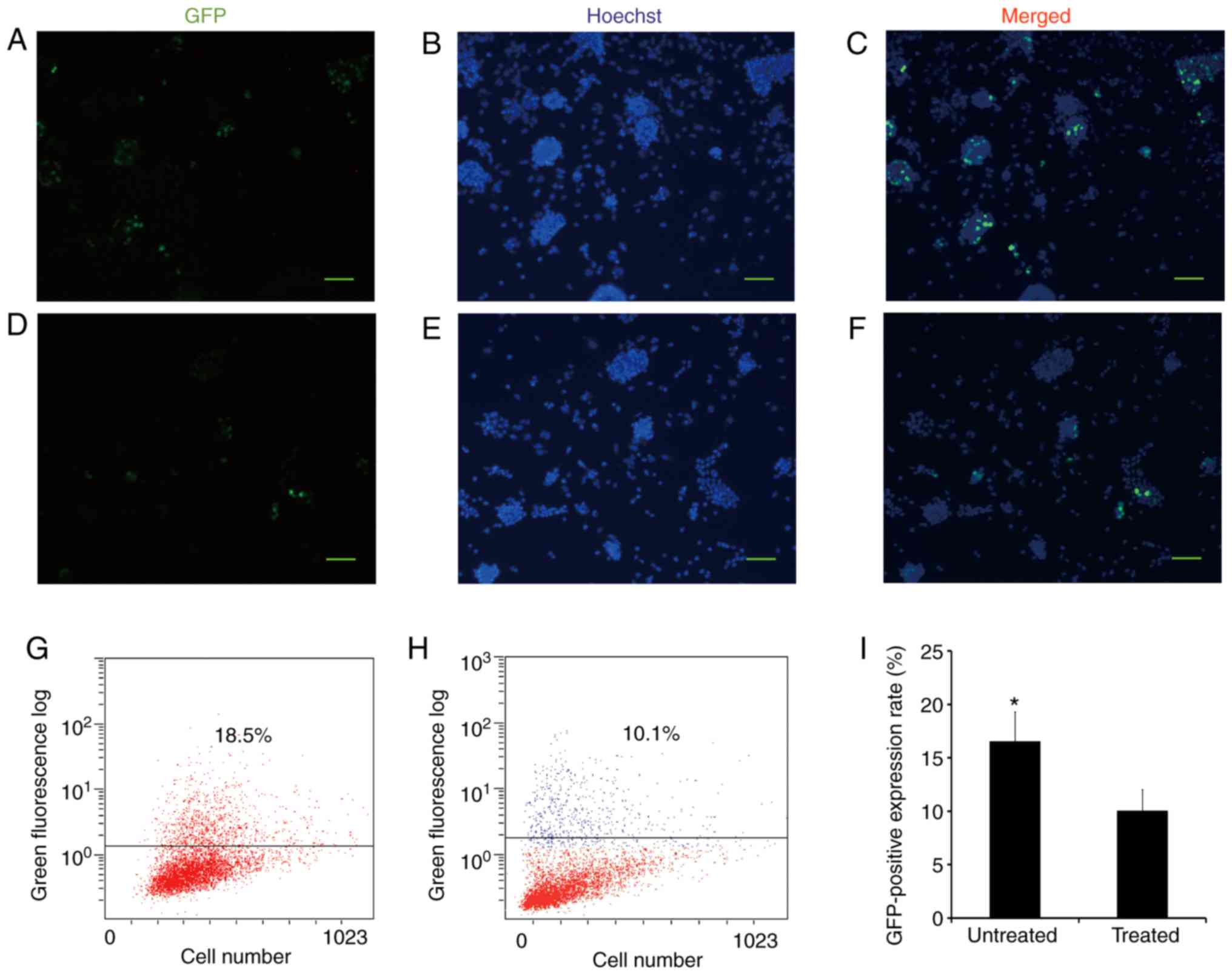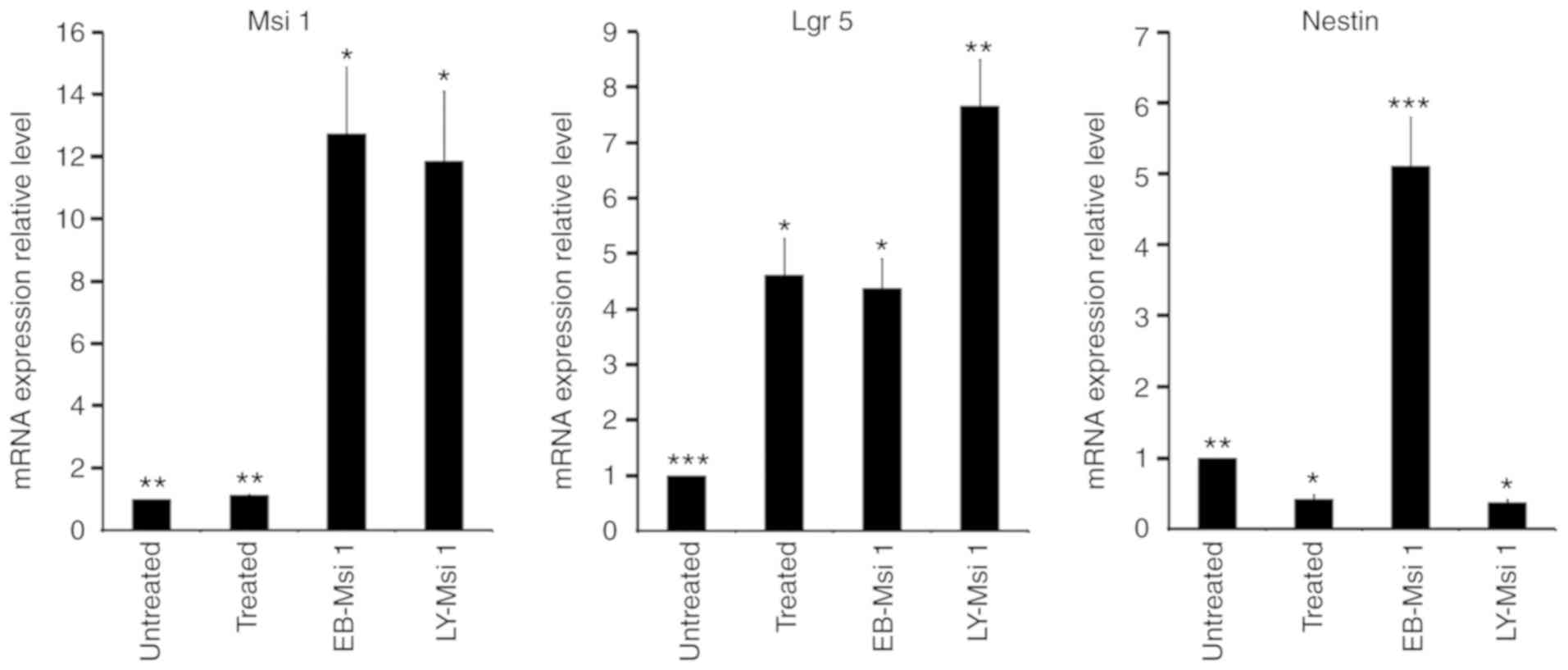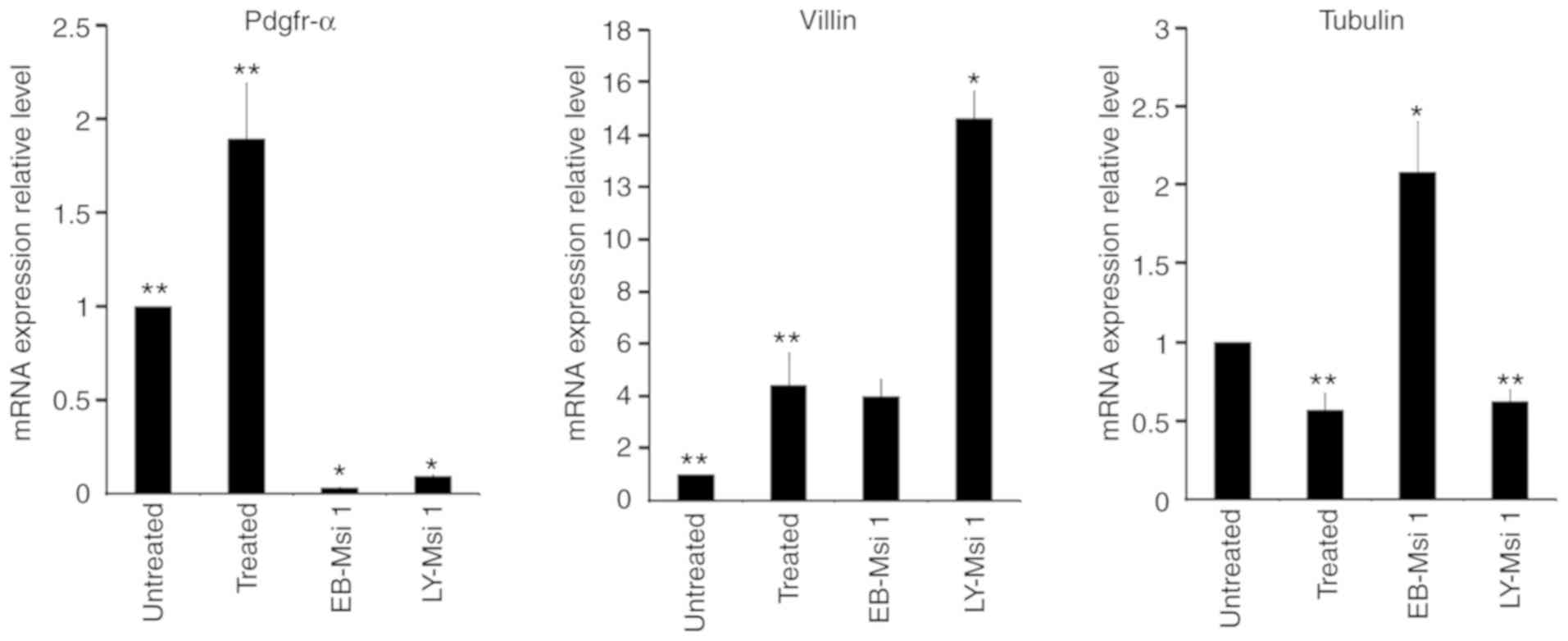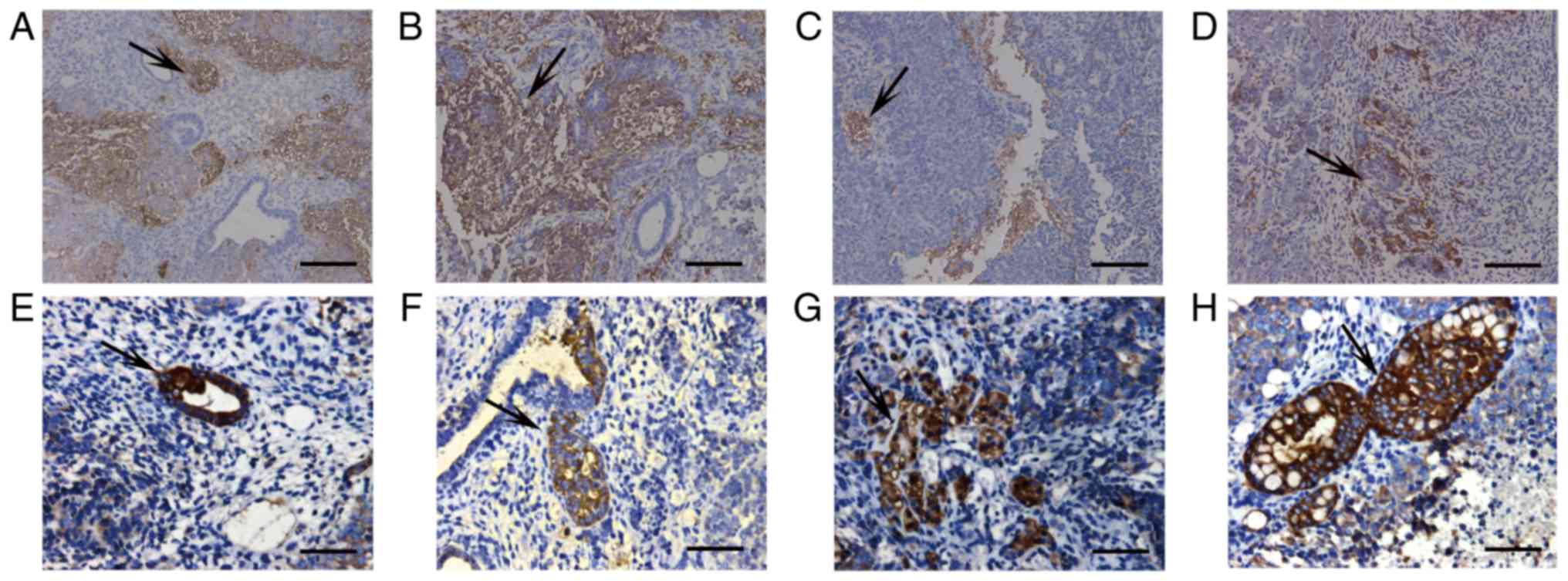|
1
|
Nakamura M, Okano H, Blendy JA and Montell
C: Musashi, a neural rna-binding protein required for drosophila
adult external sensory organ development. Neuron. 13:67–81. 1994.
View Article : Google Scholar : PubMed/NCBI
|
|
2
|
Okano H, Imai T and Okabe M: Musashi: A
translational regulator of cell fate. J Cell Sci. 115:1355–1359.
2002.PubMed/NCBI
|
|
3
|
Sakakibara S, Imai T, Hamaguchi K, Okabe
M, Aruga J, Nakajima K, Yasutomi D, Nagata T, Kurihara Y, Uesugi S,
et al: Mouse-Musashi-1, a neural RNA-Binding protein highly
enriched in the mammalian CNS stem cell. Dev Biol. 176:230–242.
1996. View Article : Google Scholar : PubMed/NCBI
|
|
4
|
Potten CS, Booth C, Tudor GL, Booth D,
Brady G, Hurley P, Ashton G, Clarke R, Sakakibara S and Okano H:
Identification of a putative intestinal stem cell and early lineage
marker; Musashi-1. Differentiation. 71:28–41. 2003. View Article : Google Scholar : PubMed/NCBI
|
|
5
|
Okano H, Kawahara H, Toriya M, Nakao K,
Shibata S and Imai T: Function of RNA-binding protein Musashi-1 in
stem cells. Exp Cell Res. 306:349–356. 2005. View Article : Google Scholar : PubMed/NCBI
|
|
6
|
Sakatani T, Kaneda A, Iacobuzio-Donahue
CA, Carter MG, de Boom Witzel S, Okano H, Ko MS, Ohlsson R, Longo
DL and Feinberg AP: Loss of imprinting of Igf2 alters intestinal
maturation and tumorigenesis in mice. Science. 307:1976–1978. 2005.
View Article : Google Scholar : PubMed/NCBI
|
|
7
|
Arumugam K, Macnicol MC and Macnicol AM:
Autoregulation of Musashi1 mRNA translation during Xenopus oocyte
maturation. Mol Reprod Dev. 79:553–563. 2012. View Article : Google Scholar : PubMed/NCBI
|
|
8
|
Booth C and Potten CS: Gut instincts:
Thoughts on intestinal epithelial stem cells. J Clin Invest.
105:1493–1499. 2000. View
Article : Google Scholar : PubMed/NCBI
|
|
9
|
Kayahara T, Sawada M, Takaishi S, Fukui H,
Seno H, Fukuzawa H, Suzuki K, Hiai H, Kageyama R, Okano H and Chiba
T: Candidate markers for stem and early progenitor cells, Musashi-1
and Hes1, are expressed in crypt base columnar cells of mouse small
intestine. FEBS Lett. 535:131–135. 2003. View Article : Google Scholar : PubMed/NCBI
|
|
10
|
Fukui T, Takeda H, Shu HJ, Ishihama K,
Otake S, Suzuki Y, Nishise S, Ito N, Sato T, Togashi H and Kawata
S: Investigation of Musashi-1 expressing cells in the murine model
of dextran sodium sulfate-induced colitis. Dig Dis Sci.
51:1260–1268. 2006. View Article : Google Scholar : PubMed/NCBI
|
|
11
|
Kaneko J and Chiba C: Immunohistochemical
analysis of Musashi-1 expression during retinal regeneration of
adult newt. Neurosci Lett. 450:252–257. 2008. View Article : Google Scholar : PubMed/NCBI
|
|
12
|
Yamada T, Yoshikawa M, Takaki M, Torihashi
S, Kato Y, Nakajima Y, Ishizaka S and Tsunoda Y: In vitro
functional gut-like organ formation from mouse embryonic stem
cells. Stem Cells. 20:41–49. 2002. View Article : Google Scholar : PubMed/NCBI
|
|
13
|
Takaki M, Nakayama S, Misawa H, Nakagawa T
and Kuniyasu H: In vitro formation of enteric neural network
structure in a gut-like organ differentiated from mouse embryonic
stem cells. Stem Cells. 24:1414–1422. 2006. View Article : Google Scholar : PubMed/NCBI
|
|
14
|
Kaneko Y, Sakakibara S, Imai T, Suzuki A,
Nakamura Y, Sawamoto K, Ogawa Y, Toyama Y, Miyata T and Okano H:
Musashi1: An evolutionally conserved marker for CNS progenitor
cells including neural stem cells. Dev Neurosci. 22:139–153. 2000.
View Article : Google Scholar : PubMed/NCBI
|
|
15
|
Maslov AY, Barone TA, Plunkett RJ and
Pruitt SC: Neural stem cell detection, characterization, and
age-related changes in the subventricular zone of mice. J Neurosci.
24:1726–1733. 2004. View Article : Google Scholar : PubMed/NCBI
|
|
16
|
Lan SY, Yu T, Xia ZS, Yuan YH, Shi L, Lin
Y, Huang KH and Chen QK: Musashi 1-positive cells derived from
mouse embryonic stem cells can differentiate into neural and
intestinal epithelial-like cells in vivo. Cell Biol Int.
34:1171–1180. 2010. View Article : Google Scholar : PubMed/NCBI
|
|
17
|
Simon TC and Gordon JI: Intestinal
epithelial cell differentiation: New insights from mice, flies and
nematodes. Curr Opin Genet Dev. 5:577–586. 1995. View Article : Google Scholar : PubMed/NCBI
|
|
18
|
Hellmich HL, Kos L, Cho ES, Mahon KA and
Zimmer A: Embryonic expression of glial cell-line derived
neurotrophic factor (GDNF) suggests multiple developmental roles in
neural differentiation and epithelial-mesenchymal interactions.
Mech Dev. 54:95–105. 1996. View Article : Google Scholar : PubMed/NCBI
|
|
19
|
Gao N, White P and Kaestner KH:
Establishment of intestinal identity and epithelial-mesenchymal
signaling by. Dev Cell. 16:588–599. 2009. View Article : Google Scholar : PubMed/NCBI
|
|
20
|
Pai YJ, Abdullah NL, Mohd-Zin SW, Mohammed
RS, Rolo A, Greene ND, Abdul-Aziz NM and Copp AJ: Epithelial fusion
during neural tube morphogenesis. Birth Defects Res A Clin Mol
Teratol. 94:817–823. 2012. View Article : Google Scholar : PubMed/NCBI
|
|
21
|
Zheng H, Fu G, Dai T and Huang H:
Migration of endothelial progenitor cells mediated by stromal
cell-derived factor-1alpha/CXCR4 via PI3K/Akt/eNOS signal
transduction pathway. J Cardiovasc Pharmacol. 50:274–280. 2007.
View Article : Google Scholar : PubMed/NCBI
|
|
22
|
Yu J, Li M, Qu Z, Yan D, Li D and Ruan Q:
SDF-1/CXCR4-mediated migration of transplanted bone marrow stromal
cells toward areas of heart myocardial infarction through
activation of PI3K/Akt. J Cardiovasc Pharmacol. 55:496–505.
2010.PubMed/NCBI
|
|
23
|
Wang H, Yin Y, Li W, Zhao X, Yu Y, Zhu J,
Qin Z, Wang Q, Wang K, Lu W, et al: Over-expression of PDGFR-β
promotes PDGF-induced proliferation, migration, and angiogenesis of
EPCs through PI3K/Akt signaling pathway. PLoS One. 7:e305032012.
View Article : Google Scholar
|
|
24
|
Cantley LC: The phosphoinositide 3-kinase
pathway. Science. 296:1655–1657. 2002. View Article : Google Scholar : PubMed/NCBI
|
|
25
|
Paling NR, Wheadon H, Bone HK and Welham
MJ: Regulation of embryonic stem cell self-renewal by
phosphoinositide 3-kinase-dependent signaling. J Biol Chem.
279:48063–48070. 2004. View Article : Google Scholar : PubMed/NCBI
|
|
26
|
Storm MP, Kumpfmueller B, Thompson B,
Kolde R, Vilo J, Hummel O, Schulz H and Welham MJ: Characterization
of the phosphoinositide 3-kinase-dependent transcriptome in murine
embryonic stem cells: Identification of novel regulators of
pluri-potency. Stem Cells. 27:764–775. 2009. View Article : Google Scholar : PubMed/NCBI
|
|
27
|
Mclean AB, D’Amour KA, Jones KL,
Krishnamoorthy M, Kulik MJ, Reynolds DM, Sheppard AM, Liu H, Xu Y,
Baetge EE and Dalton S: Activin a efficiently specifies definitive
endoderm from human embryonic stem cells only when
phosphatidylinositol 3-kinase signaling is suppressed. Stem Cells.
25:29–38. 2007. View Article : Google Scholar : PubMed/NCBI
|
|
28
|
Roche S, Koegl M and Courtneidge SA: The
phosphatidylinositol 3-kinase alpha is required for DNA synthesis
induced by some, but not all, growth factors. Proc Natl Acad Sci
USA. 91:9185–9189. 1994. View Article : Google Scholar : PubMed/NCBI
|
|
29
|
Shivakrupa R, Bernstein A, Watring N and
Linnekin D: Phosphatidylinositol 3′-kinase is required for growth
of mast cells expressing the kit catalytic domain mutant. Cancer
Res. 63:4412–4419. 2003.PubMed/NCBI
|
|
30
|
Livak KJ and Schmittgen TD: Analysis of
relative gene expression data using real-time quantitative PCR and
the 2(T)(−Delta Delta C) method. Methods. 25:402–408. 2001.
View Article : Google Scholar
|
|
31
|
Lianguzova MS, Chuykin IA, Nordheim A and
Pospelov VA: Phosphoinositide 3-kinase inhibitor LY294002 but not
serum withdrawal suppresses proliferation of murine embryonic stem
cells. Cell Biol Int. 31:330–337. 2007. View Article : Google Scholar : PubMed/NCBI
|
|
32
|
May R, Sureban SM, Hoang N, Riehl TE,
Lightfoot SA, Ramanujam R, Wyche JH, Anant S and Houchen CW:
Doublecortin and cam kinase-like-1 and
leucine-rich-repeat-containing G-protein-coupled receptor mark
quiescent and cycling intestinal stem cells, respectively. Stem
Cells. 27:2571–2579. 2009. View Article : Google Scholar : PubMed/NCBI
|
|
33
|
Braun H, Schäfer K and Höllt V: BetaIII
tubulin-expressing neurons reveal enhanced neurogenesis in
hippocampal and cortical structures after a contusion trauma in
rats. J Neurotrauma. 19:975–983. 2002. View Article : Google Scholar : PubMed/NCBI
|
|
34
|
Guo J, Walss-Bass C and Ludueña RF: The
beta isotypes of tubulin in neuronal differentiation. Cytoskeleton
(Hoboken). 67:431–441. 2010. View Article : Google Scholar
|
|
35
|
Guo J, Qiang M and Ludueña RF: The
distribution of β-tubulin isotypes in cultured neurons from
embryonic, newborn, and adult mouse brains. Brain Res. 1420:8–18.
2011. View Article : Google Scholar : PubMed/NCBI
|
|
36
|
Maunoury R, Robine S, Pringault E, Huet C,
Guénet JL, Gaillard JA and Louvard D: Villin expression in the
visceral endoderm and in the gut anlage during early mouse
embryogenesis. EMBO J. 7:3321–3329. 1988. View Article : Google Scholar : PubMed/NCBI
|
|
37
|
Pinto D, Robine S, Jaisser F, EI Marjou FE
and Louvard D: Regulatory sequences of the mouse villin gene that
efficiently drive transgenic expression in immature and
differentiated epithelial cells of small and large intestines. J
Biol Chem. 274:6476–6482. 1999. View Article : Google Scholar : PubMed/NCBI
|
|
38
|
Takakura N, Yoshida H, Ogura Y, Kataoka H
and Nishikawa S and Nishikawa S: PDGFR alpha expression during
mouse embryogenesis: Immunolocalization analyzed by whole-mount
immunohistostaining using the monoclonal anti-mouse PDGFR alpha
antibody APA5. J Histochem Cytochem. 45:883–893. 1997. View Article : Google Scholar : PubMed/NCBI
|
|
39
|
Karlsson L, Lindahl P, Heath JK and
Betsholtz C: Abnormal gastrointestinal development in PDGF-A and
PDGFR-(alpha) deficient mice implicates a novel mesenchymal
structure with putative instructive properties in villus
morphogenesis. Development. 127:3457–3466. 2000.PubMed/NCBI
|
|
40
|
Takebe A, Era T, Okada M, Martin Jakt L,
Kuroda Y and Nishikawa S: Microarray analysis of PDGFRα +
populations in ES cell differentiation culture identifies genes
involved in differentiation of mesoderm and mesenchyme including
ARID3b that is essential for development of embryonic mesenchymal
cells. Dev Biol. 293:25–37. 2006. View Article : Google Scholar : PubMed/NCBI
|
|
41
|
Oviedo-Boyso J, Cortés-Vieyra R,
Huante-Mendoza A, Yu HB, Valdez-Alarcón JJ, Bravo-Patiño A,
Cajero-Juárez M, Finlay BB and Baizabal-Aguirre VM: The
phosphoinositide-3-kinase-Akt signaling pathway is important for
Staphylococcus aureus internalization by endothelial cells. Infect
Immun. 79:4569–4577. 2011. View Article : Google Scholar : PubMed/NCBI
|
|
42
|
Semba S, Itoh N, Ito M, Harada M and
Yamakawa M: The in vitro and in vivo effects of
2-(4-morpholinyl)-8- phenyl-chromone (LY294002), a specific
inhibitor of phosphatidylinositol 3′-kinase, in human colon cancer
cells. Clin Cancer Res. 8:1957–1963. 2002.PubMed/NCBI
|
|
43
|
Xu XY, Zhang Z, Su WH, Zhang Y, Feng C,
Zhao HM, Zong ZH, Cui C and Yu BZ: Involvement of the p110 alpha
isoform of PI3K in early development of mouse embryos. Mol Reprod
Dev. 76:389–398. 2009. View Article : Google Scholar
|
|
44
|
van der Flier LG and Clevers H: Stem
cells, self-renewal, and differentiation in the intestinal
epithelium. Annu Rev Physiol. 71:241–260. 2009. View Article : Google Scholar
|















